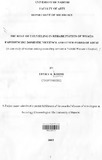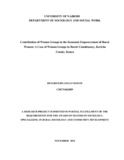| dc.contributor.author | Kabira, Wanjiku M | |
| dc.date.accessioned | 2015-07-22T07:59:45Z | |
| dc.date.available | 2015-07-22T07:59:45Z | |
| dc.date.issued | 2015 | |
| dc.identifier.uri | http://journals.uonbi.ac.ke/index.php/aws/article/view/1311/1108 | |
| dc.description.abstract | This paper aims at demonstrating that
women’s experiences and knowledge about
food security are critical in order to create all
inclusive and more comprehensive policies not
only in food security but also in other areas of
importance as well. The paper is
guided by a
feminist theoretical framework that sees
women as the starting point. It further argues
that women’s knowledge and experiences
have remained invisible and underutilized by
policy makers and development workers. The
paper is also guided by an ap
preciation of the
fact that research methods have themselves
been products of a male knowledge
development process, and therefore, have
enhanced exclusion and marginalization of
women’s perspectives. The desire, therefore,
to identify research methods that
allow
researchers to access women’s knowledge is
a critical factor in this research which chose to
use women friendly methodologies such as
oral testimonies and focus group discussions
that allow women to tell their story in the way
they know bes | en_US |
| dc.language.iso | en | en_US |
| dc.publisher | University of Nairobi | en_US |
| dc.subject | African feminism, Oral testimonies, validation, methodology, feminist pathways, women’s reference group, women’s knowledge, women’s experiences | en_US |
| dc.title | Validating women’s knowledge and experiences: A case study of women’s experiences and food security in Kenya | en_US |
| dc.type | Article | en_US |
| dc.type.material | en_US | en_US |



